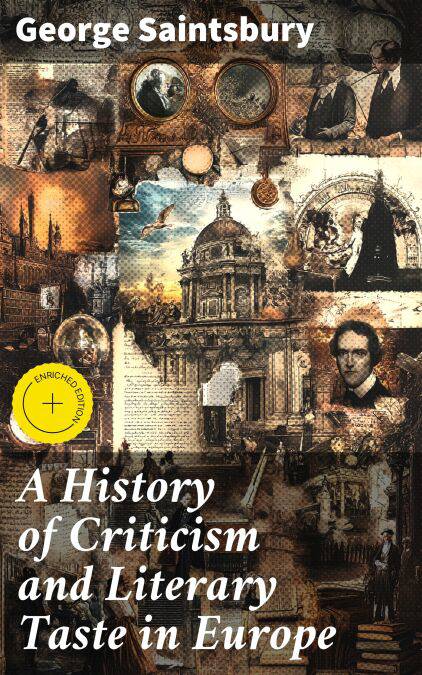
- Retrait en 2 heures
- Assortiment impressionnant
- Paiement sécurisé
- Toujours un magasin près de chez vous
- Retrait gratuit dans votre magasin Club
- 7.000.0000 titres dans notre catalogue
- Payer en toute sécurité
- Toujours un magasin près de chez vous
A History of Criticism and Literary Taste in Europe EBOOK
Enriched edition. Classical and Mediæval Criticism
George Saintsbury
Ebook | Anglais
1,99 €
+ 1 points
Description
In "A History of Criticism and Literary Taste in Europe," George Saintsbury offers a comprehensive examination of the evolution of literary criticism from the classical era to the late 19th century. This scholarly work combines historical analysis with critical insight, tracing the intertwined development of literature and its critics across the European landscape. Saintsbury employs a clear, engaging prose style that emphasizes both the aesthetic principles and the cultural contexts that shaped literary tastes. This meticulously researched volume highlights notable critics and pivotal works, situating them within broader philosophical and societal transformations that have influenced the appreciation of literature. Saintsbury, a distinguished literary scholar and critic himself, was deeply immersed in the study of the English literary canon and its European counterparts. His background in classical literature and his role as a professor of English literature profoundly influenced his desire to explore how critical attitudes evolved alongside the literature it scrutinized. His keen observations and erudition illuminate influences from various schools of thought, providing readers with a rich context for understanding the dynamics of literary taste. For scholars and enthusiasts alike, "A History of Criticism and Literary Taste in Europe" is an invaluable resource that invites readers to contemplate the legacy of literary criticism and its essential role in shaping artistic expression. This work is particularly recommended for those seeking to grasp the historical underpinnings of literary appreciation and the ongoing dialogue between writers and their critics.
In this enriched edition, we have carefully created added value for your reading experience:
- A succinct Introduction situates the work's timeless appeal and themes.
- The Synopsis outlines the central plot, highlighting key developments without spoiling critical twists.
- A detailed Historical Context immerses you in the era's events and influences that shaped the writing.
- A thorough Analysis dissects symbols, motifs, and character arcs to unearth underlying meanings.
- Reflection questions prompt you to engage personally with the work's messages, connecting them to modern life.
- Hand‐picked Memorable Quotes shine a spotlight on moments of literary brilliance.
- Interactive footnotes clarify unusual references, historical allusions, and archaic phrases for an effortless, more informed read.
In this enriched edition, we have carefully created added value for your reading experience:
- A succinct Introduction situates the work's timeless appeal and themes.
- The Synopsis outlines the central plot, highlighting key developments without spoiling critical twists.
- A detailed Historical Context immerses you in the era's events and influences that shaped the writing.
- A thorough Analysis dissects symbols, motifs, and character arcs to unearth underlying meanings.
- Reflection questions prompt you to engage personally with the work's messages, connecting them to modern life.
- Hand‐picked Memorable Quotes shine a spotlight on moments of literary brilliance.
- Interactive footnotes clarify unusual references, historical allusions, and archaic phrases for an effortless, more informed read.
Spécifications
Parties prenantes
- Auteur(s) :
- Editeur:
Contenu
- Nombre de pages :
- 501
- Langue:
- Anglais
Caractéristiques
- EAN:
- 8596547662754
- Date de parution :
- 09-07-23
- Format:
- Ebook
- Protection digitale:
- Digital watermarking
- Format numérique:
- ePub

Seulement chez Librairie Club
+ 1 points sur votre carte client de Librairie Club
Les avis
Nous publions uniquement les avis qui respectent les conditions requises. Consultez nos conditions pour les avis.





